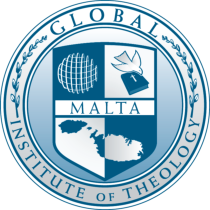Global Institute of Theology | CHRISTINE 17, Triq il-Klin, Iklin IKL1030 MALTA EU | Tel: 00356 79475618 | info@git.edu.mt
Ethics and Academic Integrity





WHAT PLAGIARISM IS
First, plagiarism can easily be distinguished from piracy. Piracy is the sale of attributed but
unauthorized copies of a work, an act depriving the author of profit but not credit. Depriving
authors of profit that is rightfully theirs is theft, but here we focus on credit rather than profit.
Depriving authors of credit might also be a form of theft. We often think that ideas and their
expression belong to the author as if they were private property the author's intellectual
property. On this view, plagiarists steal the work of others, taking for themselves the credit of
ownership and thereby depriving the original authors of this benefit. If intellectual property is
like physical property, the analogy helps explain subtler forms of plagiarism.
For example, most people know that taking the exact wording of another person without
attribution is plagiarism, but believe that paraphrasing the original without attribution is
acceptable. Yet taking someone else's idea and changing the wording could be compared to
stealing a car and changing its color.
However, literary works that are stolen differ in important ways from physical objects that are
the targets of ordinary theft. Ideas are less tangible and identifiable than physical objects.
Objects that are stolen remain stolen even if they are taken apart and recombined. Not so
with ideas. Building new ideas from old ideas, using existing components and combining
them in new ways might be creativity, not plagiarism. It is often difficult to determine what
counts as a new idea and what requires acknowledgment as a variation on an old idea.
Conventions for giving credit vary from field to field. For example, much has been written
about ill-fated love or problems with parent-child relations without giving credit to
Shakespeare or Aeschylus. In literature the form of the expression is more important than the
basic plot idea. In fact some critics claim that there are only a small number of basic plots in
all of literature. To count as plagiarism in literature a description must steal the form of the
original, not just the structure. However, in the sciences, reporting the research results of
another without attribution is plagiarism, even if the words and style of the report are very
different. In order to know what should be credited to others, one has to know the practices
of that field. And even then it may not be clear. In areas such as computer programming and
music composition, what counts as plagiarism is still being argued in the courts.
Unlike physical objects that belong to someone else, we are expected to pick up the ideas of
others and take them with us. We remember ideas without remembering where they came
from because recalling the source of an idea is often more difficult than recalling the idea
itself. Therefore it is possible to commit plagiarism without realizing that one is doing so.
Learning to avoid plagiarism requires careful training in a system of conventions particular to
a field, unlike learning to avoid theft. This may explain why several great thinkers of the past
have recently been accused of plagiarism. Under today's conventions of attribution, what
they did constitutes plagiarism. But the conventions of today are not the same as in the past
when writers usually cited another person's work only to invoke authority.
Plagiarism differs from theft in a more profound way. Taking an object that has been
abandoned or given away is not considered stealing. But copying the ideas of an anonymous
author, or claiming credit for an idea given to you by a friend who does not wish to claim
authorship, is considered plagiarism.
If words and ideas were merely property, and plagiarism merely a form of theft, then there
would be nothing wrong with buying the rights to authorship from another, as in the case of
commercial term-paper services. The original authors sell their claim to authorship for
money. The plagiarist who uses these services is not stealing the credit from another person
because the original author does not want the credit. But credit for authorship is not
something that can be sold or given away. Credit for authorship is so undetachable that even
the reverse of stealing, falsely attributing one's own work to another, is wrong; it constitutes
forgery.
In the realm of ideas and their expression, one is evaluated not for owning the rights to a
work but for having been its originator. Ideas and forms of expression are, in this sense, closer
to moral actions than to property. The credit due the originator cannot be transferred to
someone else, even if both parties agree to the transfer. As with a moral action, responsibility,
whether credit worthy or blame worthy, inheres in the agent.



















